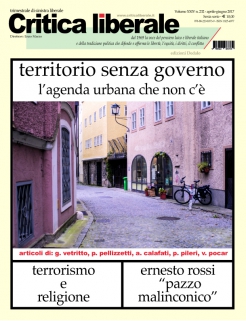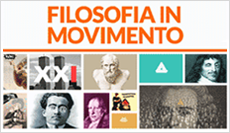|
|
|


|

|
Direttore: Enzo Marzo
Dal 1969 la voce del pensiero laico e liberale italiano e
della tradizione politica che difende e afferma le libertà, l'equità, i diritti, il conflitto.
"Critica liberale" segue il filo rosso che tiene assieme protagonisti come Giovanni Amendola e Benedetto Croce,
Gobetti e i fratelli Rosselli, Salvemini ed Ernesto Rossi, Einaudi e il "Mondo" di Pannunzio, gli "azionisti" e Bobbio.

volume XXIV, n.232 estate 2017
 territorio senza governo - l'agenda urbana che non c'è
territorio senza governo - l'agenda urbana che non c'è
INDICE
taccuino
.
67. paolo bagnoli, la nostra preoccupazione
68. coordinamento democrazia costituzionale, appello alla mobilitazione per una legge elettorale conforme alla Costituzione
106. comitati unitari per il NO al “rosatellum”, l’imbroglio degli imbrogli
.
territorio senza governo
.
69. giovanni vetritto, l’italia del “non governo” locale
73. pierfranco pellizzetti, alla ricerca del civismo perduto
79. antonio calafati, le periferie delle metropoli italiane
84. paolo pileri, molta retorica, pochi fatti
86. giovanni vetritto, post-marxisti inutili
88. valerio pocar, primo comandamento: cementificare
.
astrolabio
.
89. riccardo mastrorillo, finanziare sì, ma come?
.
GLI STATI UNITI D'EUROPA
.
93. sarah lenderes-valenti, la risorsa più grande
94. luigi somma, le democrazie invisibili
97. claudio maretto, la discontinuità paga
.
castigat ridendo mores
.
100. elio rindone, basta con l’onestà!
.
l'osservatore laico
.
103. carla corsetti, il principio di laicità
107. gaetano salvemini, abolire il concordato
.
terrorismo e religione
109. pierfranco pellizzetti, jihad combattuta alla john wayne
114. alessandro cavalli,quattro cerchi
.
lo spaccio delle idee
117. gianmarco pondrano altavilla, cari liberisti, chi conosce un buon medium?
118. luca tedesco, savoia o borbone? lo storico è un apolide
119. gaetano pecora, ernesto rossi, “pazzo malinconico”
.
78.92.102. spilli de la lepre marzolina
116. la lepre marzolina, di maio ’o statista
.
.
.
Critica liberale può essere acquistata anche on line attraverso il sito delle Edizioni Dedalo con transazione crittografata e protetta.
.A ROMA IL FASCICOLO PUO' ESSERE ACQUISTATO ANCHE PRESSO L'EDICOLA DEI GIORNALI IN PIAZZA DEL PARLAMENTO.
.
Il numero di “Critica liberale” può essere acquistato nelle seguenti librerie:
&&&&&&&&&& PIEMONTE &&&&&&&&&&
BORGOMANERO
EP, v.le marazza, 10 galleria principe
VERBANIA
MARGAROLI, corso mameli, 55
&&&&&&&&&& LOMBARDIA &&&&&
ASSAGO
INTERNET, via verdi, 8
BRESCIA
CENTRO, via di vittorio, 7/c
CENTRO, via galvani, 6 c/d (SAN ZENO)
MILANO
PUCCINI, via boscovich, 61
EMME ELLE, via marsala, 2
FELTRINELLI, corso buenos aires, 33/35
FELTRINELLI, via u. foscolo, 1/3
FELTRINELLI, via manzoni, 12
PUCCINI, c.so buenos aires, 42
TADINO, via tadino, 18
&&&&&&&&&& VENETO &&&&&&&&&&
TREVISO
CANOVA, piazzetta lombardi, 1
VICENZA
GALLA, c.so palladio, 11
GALLA LIBRACCIO, corso palladio, 12
&&&&&&&&&& TRENTINO ALTO ADIGE&&
TRENTO
RIVISTERIA, via s. vigilio, 23
&&&&&&&&&& EMILIA-ROMAGNA &&
BOLOGNA
FELTRINELLI, via dei mille, 12/abc
PARMA
FELTRINELLI, strada farini, 17
RAVENNA
FELTRINELLI, via diaz, 4-6-8
REGGIO EMILIA
UVER, viale e. simonazzi, 27
UVER, via maestri del lavoro, 10/b
&&&&&&&&&& UMBRIA &&&&&&&&&&
TERNI
ALTEROCCA, corso cornelio tacito, 29
&&&&&&&&&& LAZIO &&&&&&&&&&
ROMA
EDICOLA GIORNALI, piazza del parlamento
FELTRINELLI, largo torre argentina, 5
&&&&&&&&&& PUGLIE &&&&&&&&&&
BARI
FELTRINELLI, via melo, 119
|
|
|
|
 |
| |
|
newsletter |
|
|
| |
|
libelli |
|
 |
|
| |
|
|
|
|
|
|
|
 «Passans, cette terre est libre»
«Passans, cette terre est libre» - Abbiamo scelto come logo la fotografia d'un autentico "Albero della Libertà" ancora vivente. È un olmo che fu piantato nel 1799 dai rivoluzionari della Repubblica Partenopea, Luigi Rossi e Gregorio Mattei, a Montepaone Superiore, paese dello Jonio catanzarese. La scritta 'passans ecc.' era qualche volta posta sotto gli "Alberi della Libertà" in Francia.
|
|
comitato di presidenza onoraria
Mauro Barberis, Piero Bellini, Daniele Garrone, Sergio Lariccia, Pietro Rescigno, Gennaro Sasso, Carlo Augusto Viano, Gustavo Zagrebelsky.
* Hanno fatto parte del Comitato di Presidenza Onoraria: Norberto Bobbio (Presidente), Vittorio Foa, Alessandro Galante Garrone, Giancarlo Lunati, Italo Mereu, Federico Orlando, Claudio Pavone, Alessandro Pizzorusso, Stefano Rodotà, Paolo Sylos Labini. Ne ha fatto parte anche Alessandro Roncaglia, dal 9/2014 al 12/2016.
|
|
|
Eventi, segnalazioni, convegni...
|
|
|
|
|
|
 |
« torna a "Chi siamo"
about us
Critica liberale has been the voice of progressive liberalism in Italy for more than forty years.
Born in the '60s as the press agency of the internal left wing of the Italian Liberal Party, Critica liberale has been since 1974 the name a of a monthly liberal journal entirely independent of any Italian political party; since 1994 Critica liberale has also been a foundation that, together with the journal, is seeking to give voice and continuity to a political thought and tradition that has its roots in European liberalism, in the secularist and Enlightenment tradition, in the commitment to civil rights and to the integration of a federal and democratic Europe. It is one of the organisations that gave birth to the European Liberal Forum, a network of liberal foundations and think tanks connected to ELDR (the organisation that brings together all European liberals).
Critica liberale opposes the wave of populist charlatanry currently dominating the Italian political system and society, its inherent economic, political, civic and cultural corruption, and the extremist the obscurantist clericalism it artificially reimposed on the country, its inborn anti-European instincts.
We are a small think tank in Italy, but we are aware of belonging to a major and well alive European political culture. We know we come from afar: from the discovery of freedom as the core of Western political and cultural identity; from the defence of the autonomy of the individual against the dominance of medieval tradition and the principle of authority; from the struggle of heretics and libertines against obscurantism; from the early claims for freedom of conscience and religion and for the independence of scientific thought against popes, kings, absolutism and state religion; from the English and American political tradition born with the pleading in defence of press freedom by John Milton and John Locke’s proto-liberalism, from the English Bill of Rights to the American one, from David Hume to John Stuart Mill, from the New Deal to the creation of the welfare state in William Beveridge’s Great Britain, from John Rawls to Karl Popper; and from the Enlightenment and its ideal of civilisation and universal refinement of customs advocated by Voltaire and Condorcet, Verri and Beccaria, Kant and Humboldt; from the awakening of the Italian Risorgimento against the attempt to stifle the Enlightenment legacy and the liberal drives through the restoration of the Ancient Régime, and the efforts of the leaders of that Risorgimento to modernise the country so that Italy could regain the place it had lost among the cultures and nations of Western Europe; from the commitment to civil and economic modernisation of the country shared by both moderate and radical liberals, from Cavour and his action for separation in freedom of state and church, to Carlo Cattaneo and his democratic and republican militant philosophy; from the triumph of the Italian Risorgimento over the temporal power of the Roman Church; from the lesson of seriousness, responsibility and financial discipline of Quintino Sella; from the battles of liberals and radicals of the 19th century, such as Cairoli, Zanardelli and Cavallotti, to build a free, democratic, secular, modern and fair country; from the antifascism of Giovanni Amendola, Piero Gobetti, Benedetto Croce, Guido de Ruggiero, Gaetano Salvemini, Guido Calogero; from the Resistance fight of “Giustizia e Libertà”and Partito d’Azione; from the European federalist struggles of Luigi Einaudi, Altiero Spinelli and Ernesto Rossi; from those for the implementation of the republican Constitution by Piero Calamandrei and “Il Mondo” of Mario Pannunzio and Rossi; from the campaigns for freedom of culture and of the European society against the totalitarian threats of fascism and communism; from those to get the economic system and the Italian society rid of their consolidated vested interests and feudal burden, led by De Viti De Marco, Einaudi, Nitti, Fortunato and Rossi; from the achievements reached for more freedom in individual life choices, with the law on divorce, the decriminalisation of abortion and with new civil relations, the commitment to end the subordination of women, the discrimination against homosexuals and all forms of prohibitionism; from the civil opposition, still ongoing, to the predominance of illegality and populist charlatanry that have been plaguing the entire Italian political system and its society and from the civic lessons and examples of “our elders” Norberto Bobbio, Alessandro Galante Garrone and Paolo Sylos Labini.
|
|
|

















 «Passans, cette terre est libre» - Abbiamo scelto come logo la fotografia d'un autentico "Albero della Libertà" ancora vivente. È un olmo che fu piantato nel 1799 dai rivoluzionari della Repubblica Partenopea, Luigi Rossi e Gregorio Mattei, a Montepaone Superiore, paese dello Jonio catanzarese. La scritta 'passans ecc.' era qualche volta posta sotto gli "Alberi della Libertà" in Francia.
«Passans, cette terre est libre» - Abbiamo scelto come logo la fotografia d'un autentico "Albero della Libertà" ancora vivente. È un olmo che fu piantato nel 1799 dai rivoluzionari della Repubblica Partenopea, Luigi Rossi e Gregorio Mattei, a Montepaone Superiore, paese dello Jonio catanzarese. La scritta 'passans ecc.' era qualche volta posta sotto gli "Alberi della Libertà" in Francia.

